Key takeaways:
- Legislation impacts real lives, requiring an understanding of emotional responses and community narratives.
- Pro-life advocacy promotes meaningful alternatives, fostering deeper conversations around the value of human life.
- Evaluating legislation effectively involves analyzing language, stakeholder perspectives, and tracking long-term effects.
- Lessons from advocacy show the importance of feedback, the value of personal narratives, and the need for adaptability in strategies.
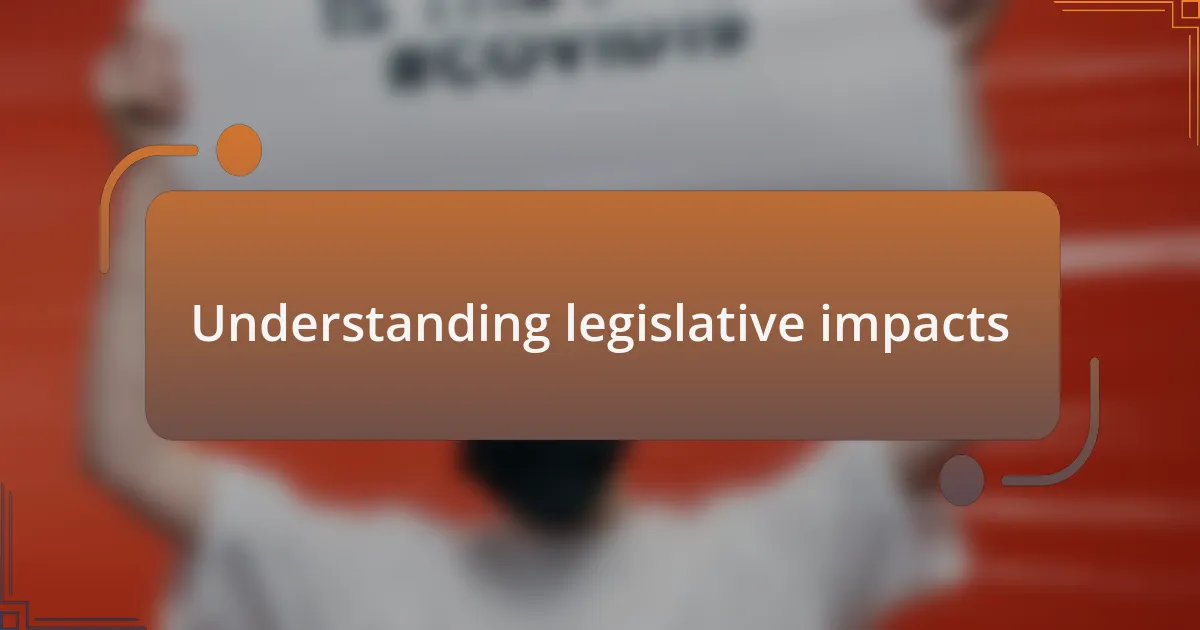
Understanding legislative impacts
Understanding legislative impacts involves more than just analyzing laws; it’s about recognizing how these laws affect real lives. I recall attending a community meeting where a local leader shared a heartfelt story about a family that was impacted by recent legislation. It struck me how policies aren’t just abstract ideas but threads that weave into the fabric of our society, influencing daily realities.
When I think about the consequences of legislation, I often reflect on how these policies can lead to significant shifts in public awareness and engagement. Have you ever thought about what happens when a new law reinforces or challenges existing beliefs? From my experience, these moments can galvanize communities into action or, conversely, cause distress, as individuals grapple with the implications of these changes.
Moreover, understanding legislative impacts requires a keen awareness of the emotional responses these laws can evoke. I vividly remember a recent debate surrounding a proposed bill where individuals shared their fears and hopes, revealing that the law was more than just a legal matter to them; it was a deeply personal issue affecting their lives and choices. Engaging with these emotional narratives provides a fuller picture of how legislation resonates within communities.
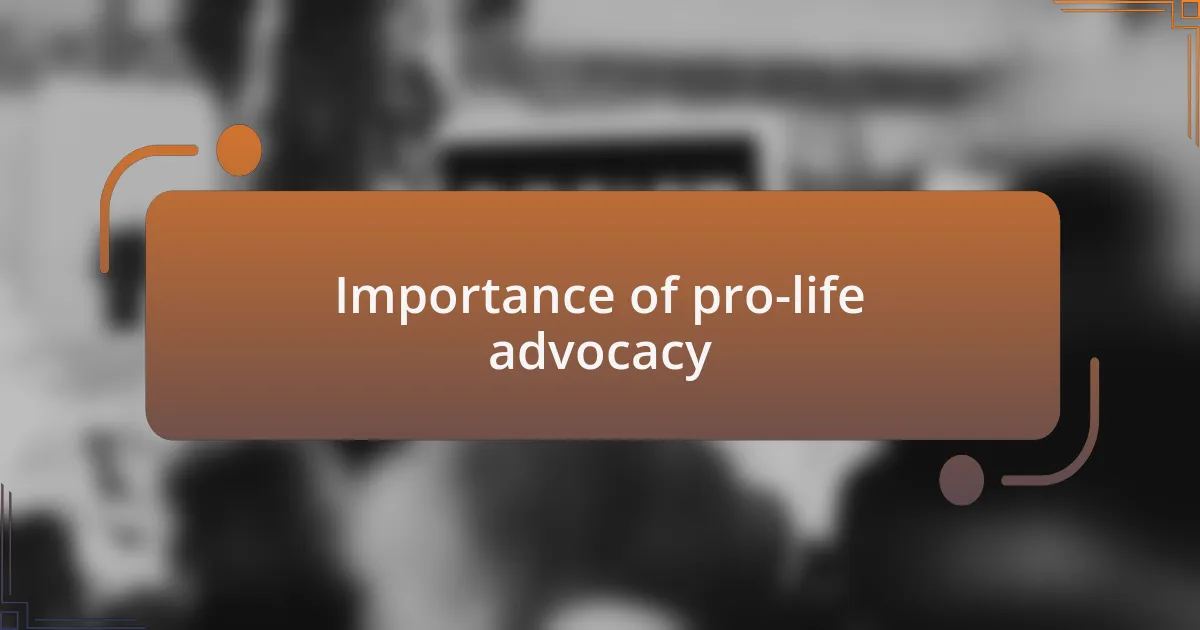
Importance of pro-life advocacy
Pro-life advocacy is essential because it stands as a powerful voice for the protection of the most vulnerable members of our society. I remember volunteering at a local crisis pregnancy center, where I met women facing unplanned pregnancies. Their stories were heartbreaking yet inspiring, highlighting the immediate need for support and understanding. This experience underscored how pro-life efforts are not just about opposing abortion; they’re about creating meaningful alternatives that honor human dignity.
In my view, pro-life advocacy plays a crucial role in shaping societal values around life and family. Reflecting on discussions I’ve had with friends, many are unaware of how legislation can impact their views on these issues. It amazes me how conversations can shift when one realizes that legislative actions can either promote a culture of life or diminish its value. Have you considered how laws influence not just choices but also the stories we tell ourselves and our children about the sanctity of life?
Ultimately, advocating for life cultivates deeper conversations about ethics, responsibility, and the value of human life in all stages. I often think back to a town hall meeting I attended, where community members shared their passionate beliefs, urging that life-affirming policies should guide our legislative agenda. It left me inspired and convinced of the importance of continuing this dialogue—it’s about advocating for a world where every life is valued and given the opportunity to thrive.
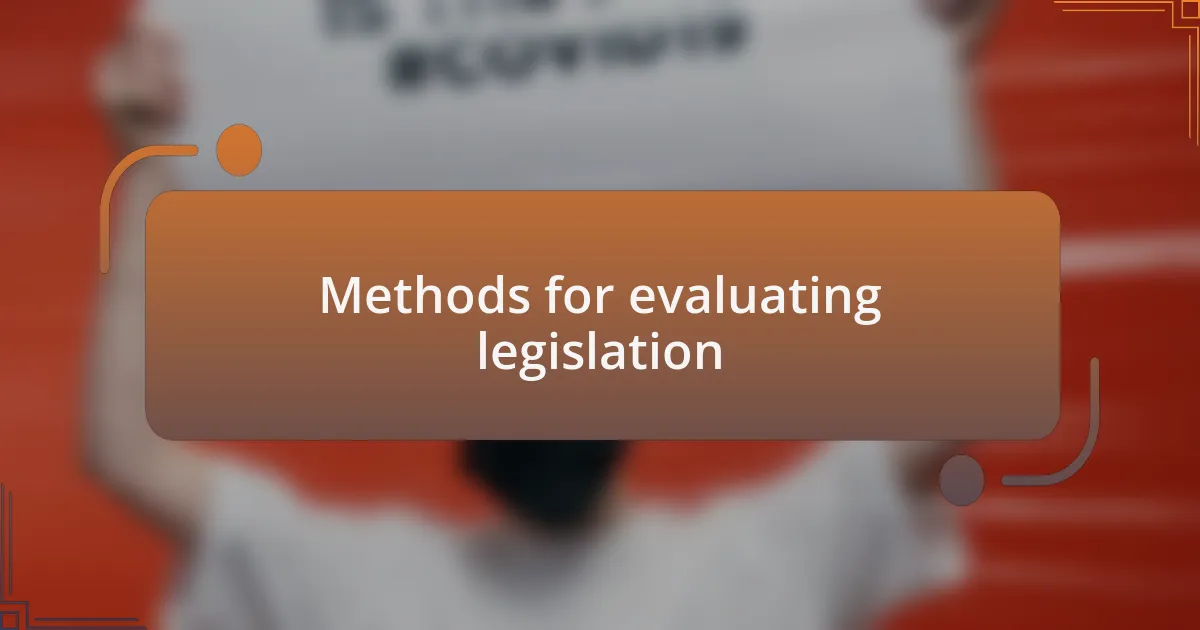
Methods for evaluating legislation
Evaluating legislation requires a multifaceted approach to truly understand its impact. One method I’ve found effective is analyzing legislative language and its potential consequences. For example, during a recent review of a bill, I noted how specific terms could either empower or undermine support systems for mothers in need. I often ask myself, how do the words chosen reflect the underlying intentions of lawmakers?
Another valuable method is stakeholder analysis, where I engage with various groups affected by the legislation. By hosting discussions with advocates, healthcare professionals, and even individuals who have faced unplanned pregnancies, I’ve gained insights into the real-world implications of proposed laws. It’s astonishing how diverse perspectives can shape a more comprehensive understanding of legislative impacts. Have you ever considered how our collective voices can influence the trajectory of such policies?
Finally, I emphasize the importance of tracking changes over time, as legislation evolves and societal attitudes shift. I’ve kept an eye on specific laws and their long-term effects on community support networks. Reflecting on previous legislative shifts, I often see patterns that reveal how temporary decisions can lead to lasting changes in societal values. Isn’t it fascinating to explore how past decisions continue to resonate in our current advocacy efforts?
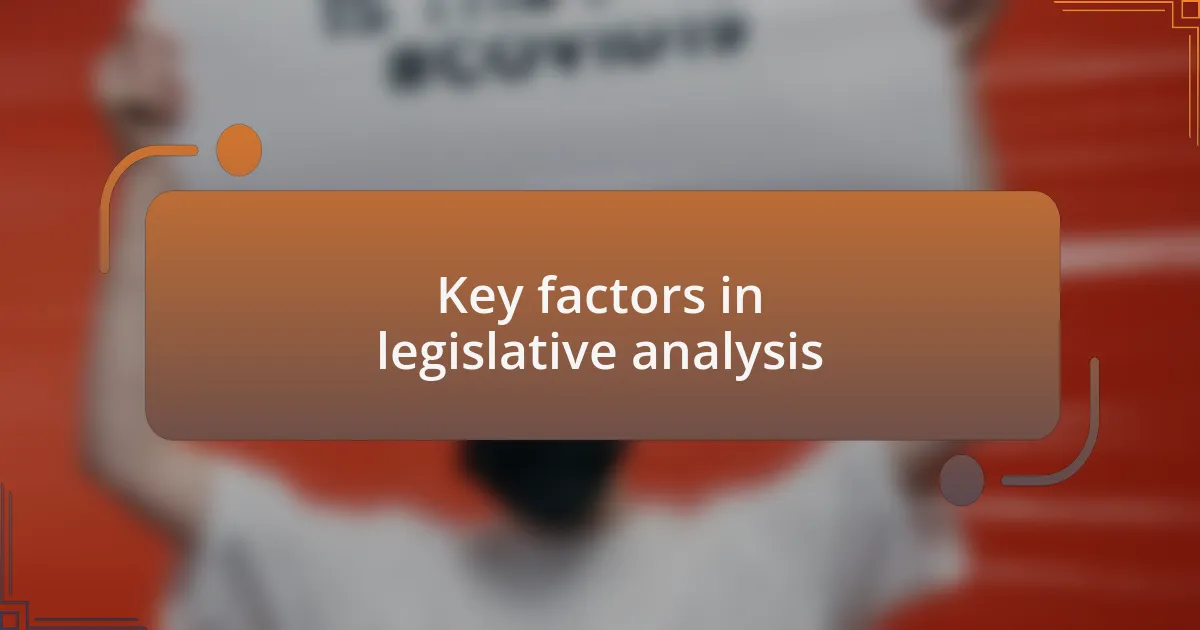
Key factors in legislative analysis
Understanding key factors in legislative analysis is crucial for making informed assessments. One factor that often stands out to me is the historical context of the legislation. When I look back on previous legislative initiatives, it’s clear that understanding their origins can shed light on why certain provisions are included. Have you ever noticed how echoes of past debates can influence current discussions? This perspective can unveil biases and assumptions that shape modern legislation.
Another essential element is the economic impact of proposed laws. I often examine how legislation can affect funding for services related to maternal care and child support. In one instance, I analyzed a bill aimed at tightening regulations on healthcare providers. It struck me how the potential financial strain could inadvertently limit access for vulnerable populations. Isn’t it critical to consider how financial ramifications can ripple through communities?
Lastly, I pay close attention to public opinion and its sway on legislative outcomes. Engaging with community members provides invaluable insights that often aren’t captured in the formal legislative process. I recall a town hall meeting where individuals shared their personal stories about unplanned pregnancies; those raw emotions dramatically influenced my perception of the proposed laws. How can we overlook the human element in these discussions? It’s this blend of personal experience and legislative knowledge that deepens my understanding of impactful advocacy.

Personal experiences with legislative impacts
There was a time when I attended a rally after the passing of a restrictive abortion law in my state. The palpable tension in the air was both alarming and enlightening. Listening to speakers recount their experiences highlighted how legislation could leave deep scars on individuals’ lives. Have you ever felt a collective grief that transcends personal stories, resonating with the pain of so many? That day, I realized how legislative decisions impact not just policy but also the emotional landscape of a community.
In another instance, I volunteered at a local crisis center, which became a space for me to witness the direct effects of policy changes in real-time. A young woman shared her story of feeling trapped by limited options due to newly imposed regulations. I couldn’t help but wonder—how can laws designed to protect also become barriers for those needing support? This experience solidified my belief that every legislative decision holds the potential to change lives, and it reinforced my commitment to advocacy.
Reflecting on my journey through these experiences, I often think about how important it is to translate these personal accounts into actionable insights for future advocacy work. During a community meeting, a mother shared how legislative changes had shifted access to critical healthcare services for her child. Her emotion stirred something in me—how often do we capture the raw truth behind the numbers and statistics? These interactions not only drive my passion for pro-life advocacy but also remind me of the broader picture behind legislative impacts.

Case studies of effective advocacy
One standout example of effective advocacy came when a coalition of pro-life organizations worked together to successfully lobby for a bill requiring counseling for women contemplating abortion. I remember attending a legislative hearing where testimonies from women who chose life were not just heard but profoundly influenced lawmakers. Hearing those stories made me ponder—how can personal narratives reshape policy and clarify the moral dimensions of such decisions?
In a different instance, I observed how a grassroots campaign mobilized local churches to host community education sessions on the effects of abortion. The emotional testimonials shared within those gatherings created an environment of empathy and solidarity, sparking dialogues that transcended mere statistics. This experience led me to wonder—what role does faith play in shaping our convictions about life and legislative choices?
Lastly, I recall a friend who spearheaded a petition drive aimed at protecting pregnancy resource centers. The determination she exhibited was infectious; it ignited passion in volunteers and emphasized the importance of local engagement. Reflecting on her efforts, I often think about the powerful impact one person’s initiative can have on a community—how does a single voice inspire collective action, and why is that so crucial in the realm of advocacy?
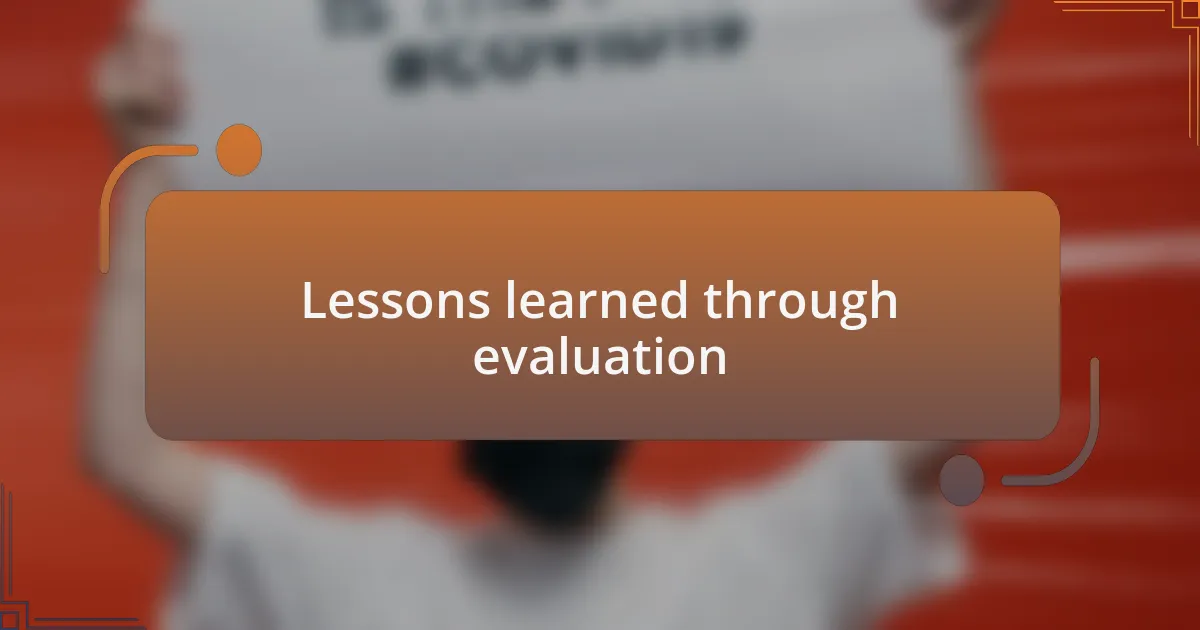
Lessons learned through evaluation
Evaluating legislative impacts has taught me the profound value of feedback. There was a time when I collaborated on a project aimed at influencing state-level legislation. Initially, we were excited about our results, but gathering input from those directly affected by the proposed laws revealed gaps in our approach. This experience highlighted the importance of listening to the voices that matter most—those living the implications of our advocacy.
I learned that metrics alone can’t capture the full story. During one particular evaluation, we focused on quantitative data like voting patterns and attendance records. However, what struck me was how the qualitative aspects—like personal stories and anecdotes shared in surveys—painted a richer, more nuanced picture of our impact. How often do we overlook the human side of our work in favor of numbers that, while informative, lack emotional resonance?
Lastly, after analyzing several campaigns, it became clear that adaptability is crucial. I remember a pivotal meeting where we discussed modifying our strategy in response to community feedback. It was a transformative moment for me; I realized that being responsive builds trust and enhances the effectiveness of our advocacy efforts. How do we ensure that our advocacy remains relevant and resonant? It lies in our ability to reflect and be willing to change.